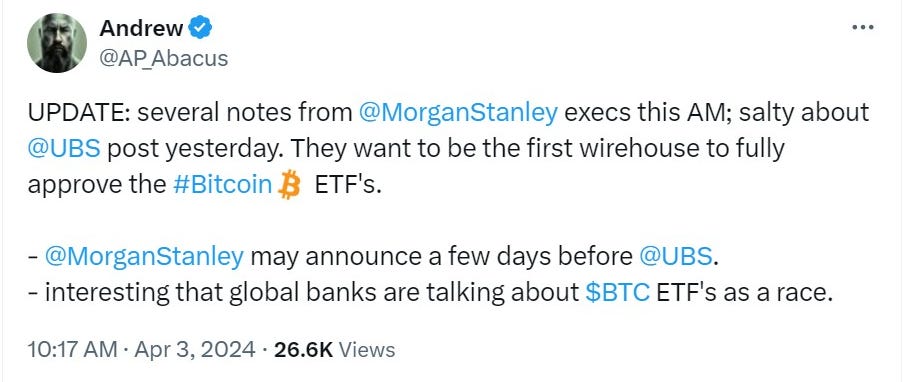Government Sales Meet Insatiable Demand for Bitcoin
Tug-of-War in Bitcoin: The Race for ETF Adoption, the Impact of Government Asset Liquidation, and Breaking Down Bitcoin Related Asset Performance.
Introduction
The Bitcoin investment landscape is being reshaped by evident supply shortages, US government asset liquidations, and a noticeable dominance of holding strategies over mining. The government's sale of Bitcoin contrasts with the accumulation trend among banks and potentially other nation-states, signaling a complex interaction of forces that could influence Bitcoin's short-term volatility and long-term value.
The news cycle is moving very quickly over the last two days, despite price being firmly in consolidation. Below, I summarize the major stories of the week so far you have to know about in this market environment.
Morgan Stanley vs UBS
Morgan Stanley aims to be the first wirehouse to launch a Bitcoin ETF, ahead of UBS.
The industry is in a waiting game, with banks observing each other before making a move.
UBS has a set timeline for introducing Bitcoin ETFs.
Morgan Stanley is reportedly vying to outpace UBS to become the first wirehouse to offer spot Bitcoin exchange-traded funds (ETFs) in the US. Andrew, @AP_Abacus on X, citing internal Morgan Stanley notes, suggested that the bank might soon announce its entry into Bitcoin ETFs. This development is part of a broader "race" among global banks to incorporate Bitcoin ETFs into their offerings. Eric Balchunas, a Bloomberg ETF expert, noted that both Morgan Stanley and UBS are yet to add Bitcoin ETFs, with the industry in a "holding pattern" waiting for one to make the first move.
Andrew responded, “UBS already approved in PWM (>$10MM) but must be marked ‘unsolicited’. Technically on the platform already. These posts are about full approval across entire platform and advisors allowed to solicit inclusion in client portfolios.”
Despite these advancements, some banks remain skeptical about Bitcoin as an investment class, with Goldman Sachs expressing doubts about its viability. They will be left behind.
A UBS spokesperson reached out to Bitcoin Magazine for comment, stating that “UBS has no plans to change the conditions for offering spot bitcoin ETFs to clients,” and that the above “social media reports regarding UBS are not accurate.”
Miner Claims Supply Shortage Force Banks to Seek Miner BTC
Wall Street banks are approaching miners like Hut 8 to buy Bitcoin directly due to ETF-induced supply shortages.
Bitcoin spot ETFs have significantly absorbed available Bitcoin, creating a shortage on exchanges.
The upcoming Bitcoin halving event is expected to further tighten supply and potentially increase Bitcoin prices.
Going direct to miners offers cost-effectiveness, discretion with limited market impact, and providence.
The success of Bitcoin spot ETFs has led to a notable shortage in Bitcoin supply, prompting prominent Wall Street banks to directly approach Bitcoin miners for purchases. Hut 8 Mining Corp, a leading Bitcoin mining company in the US, revealed in an interview that it has been approached by major banks seeking to buy Bitcoin to mitigate the shortages experienced on centralized exchanges. This situation arose as Bitcoin spot ETFs, since their inception on January 11, have drawn in over $12 billion, effectively sequestering more than 211,000 Bitcoin into ETF shares, thereby straining available supplies.
Hut 8's CEO, Asher Genoot, highlighted the urgency of the situation, stating, "We’ve had banks reach out to us to try to buy our Bitcoin because of the supply shortages on these different exchanges." This underscores the intensity of the current demand from financial institutions. Furthermore, the impending Bitcoin halving event, expected to cut the new Bitcoin supply by half, could intensify these shortages, pushing the demand and the price even higher.
Banks are approaching Bitcoin miners for direct purchases to ensure immediate and straightforward access to the bitcoin, avoiding the complexities and potential delays associated with the options market. This method is likely more cost-effective, avoiding the premiums associated with options. Direct transactions also offer discretion, reducing potential market impact on prices. Furthermore, buying directly from miners allows banks to control and verify the bitcoins' origins, ensuring they are not tainted by illicit activities. This approach also circumvents market slippage, ensuring more predictable pricing. Additionally, direct purchasing may offer clearer regulatory compliance, a significant consideration for financial institutions navigating the evolving landscape of cryptocurrency regulations.
Reasons to buy direct from miners:
Direct Supply Access: Banks ensure immediate Bitcoin acquisition, bypassing the complexities of the options market.
Price Considerations: Direct purchases may be more cost-effective than options, which include premiums.
Market Impact and Discretion: Direct buying from miners can be discreet, minimizing market price impact.
Control and Verification: Banks can verify the provenance of Bitcoins, ensuring they're not linked to illicit activities.
Avoidance of Market Slippage: Direct purchases prevent price slippage that can occur with large market orders.
Regulatory Clarity: Buying directly might offer clearer regulatory compliance compared to navigating derivatives markets.
US Government Set to Liquidate $2 Billion in Bitcoin Seized from Silk Road
The U.S. government is likely preparing to sell approximately 30,174 BTC seized from the Silk Road.
A test transaction of 0.001 BTC to Coinbase indicates imminent liquidation.
Historical precedent exists, with the government previously selling over 9,861 BTC.
The U.S. Marshals Service, responsible for asset liquidation, has sold 195,000 BTC to date.
Despite debates, the U.S. continues to sell seized Bitcoin rather than holding it as a strategic asset.
The U.S. government appears poised to sell a significant amount of Bitcoin, approximately 30,174 BTC, which it had previously seized from the Silk Road online marketplace.
A test transaction of 0.001 BTC was observed moving to Coinbase, hinting at imminent liquidation, similar to a previous incident where the government sold about 9,861 BTC. This pattern of preliminary on-chain transactions aligns with past practices observed before official sales disclosures. Despite discussions among lawmakers about retaining such confiscated assets as strategic reserves, the US Marshals Service, tasked with disposing of assets from criminal investigations, continues its mandate to sell, having already facilitated the sale of 195,000 BTC over time.
The U.S. government's decision to sell off seized Bitcoin, especially during a time when major financial entities and possibly nation-states are accumulating it, could represent a significant oversight. By offloading Bitcoin now, the government may miss out on substantial future value appreciation, potentially forgoing a strategic asset as Bitcoin gains prominence.
While this action aligns with current protocols for handling confiscated assets, it contrasts with a global trend where digital assets are increasingly viewed as valuable reserves. This decision could have implications for the US's strategic positioning in a future where bitcoin rapidly becomes globally adopted.
Bitcoin Related Assets’ Performance YTD
The year-to-date investment performance data for Bitcoin, Bitcoin-related equities, and gold reveals intriguing trends within the Bitcoin ecosystem. Bitcoin has experienced significant appreciation, influencing the performance of associated equities such as MicroStrategy, Coinbase, and mining companies, some of which have also seen considerable gains.
The analysis becomes particularly compelling when considering the broader market dynamics. The US government's plans to sell a substantial amount of Bitcoin, amidst a backdrop of supply shortages and increased accumulation by banks and potentially nation-states, introduces a complex interplay of forces. In the short term, the government's liquidation could exert downward pressure on Bitcoin's price, potentially affecting the valuation of Bitcoin-related equities. However, if institutions and other entities continue to accumulate Bitcoin, especially during dips, this could offset selling pressure and support prices.
In the long term, the combination of supply shortages, institutional accumulation, and the cyclical nature of Bitcoin's halving events set the stage for the bullish trend to continue. If Bitcoin's historical pattern of post-halving appreciation repeats, the current accumulation and subsequent reduced supply could enhance this effect, potentially leading to substantial price increases. This scenario would likely have a ripple effect across related equities, boosting their performance as part of a broader bull market in the cryptocurrency sector.
Tell us your thoughts below! What is the best portfolio allocation for Bitcoin-related assets? Will the supply shortage outweigh the government dumping?
Missed out on this week's Bitcoin Magazine Pro insights? Here's your opportunity to catch up:
Don't miss these essential reads to stay ahead in the world of Bitcoin!
If you liked this content please give a like and share! Comment below with your reactions to this post and any recommendations for future topics.
Thank you for reading Bitcoin Magazine Pro™, we sincerely appreciate your support!














Instead of approaching miners, why don't banks make a backroom deal with the US Marshals Service?